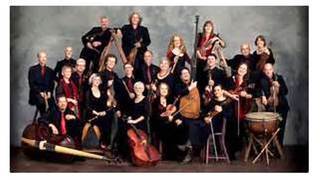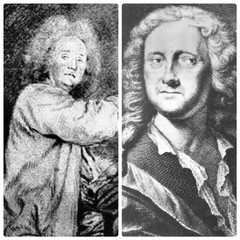|
Back
Late Baroque Culture Shock New York
Zankel Hall, Carnegie Hall
03/23/2017 -
Georg Philipp Telemann: Overture-Suite in B-flat Major “Les Nations”, TWV 55:B5
Johann Sebastian Bach: Brandenburg Concerto No. 4 in G Major , BWV 1049
Georg Frideric Handel: Almira, HWV 1: Suite
Antonio Vivaldi: Concerto In D Minor for two oboes, strings and continuo, RV 535
Jean-Féry Rebel: Les Caractères de la danse
Anna Fusek (Solo recorder), Xenia Löffler (Solo recorder, solo oboe), Michael Bosch (Solo oboe)
Akademie für Alte Musik Berlin, Bernhard Forck (Solo violin, Concertmaster)

The Akademie für Alte Musik Berlin
“Great art is not great entertainment.”
Arnold Schoenberg
After spending Wednesday evening listening to the International Street Cannibals performing Schoenberg, Webern, Berg and others of the Second Viennese School, the opportunity to hear Akademie für Alte Musik Berlin play music of the 18th Century on Thursday, would, I feel, be a simple task for the brain, as well as assuagement for the eardrums.
After all, 18th Century humans were unaware of passion, obsessional sex, moonlight demons, libidos/ids, and Freudian nightmares. Messrs Bach, Vivaldi and Handel were decent gentlemen (well, perhaps not Vivaldi at his girls’s school; and perhaps not Handel when gorging himself) and wrote decent music. And the 15 members of this quarter-century-old period instrument ensemble would soothe this savage breast.
This history is “Fake Muse”, of course. All the composers here had their inner passions, which came out in their religious music. Messiah and B Minor Mass are hardly products from the very elegant 18th Century, no matter what the chronology. And even the allegedly boring Georg Philipp Telemann was more interesting than homebody Bach. A man of compulsive wanderlust, an habitué of lowdown Polish bars as well as stately cathedrals.
The Akademie für Alte Musik Berlin (Akamus) did not come equipped for monumental works. Their quintet of musical selections was–Schoenberg’s dictum notwithstanding–music of entertainment. Amusements for the French court or the provincial opera house or as a gift for the Elector of Brandenburg (who never even looked at Bach’s six Concerti, and locked them up in a safe).
As would be expected, the group, led by a dynamic concertmaster, Bernhard Forck, stood during the concert (save the cellist and keyboards), and gave mainly dynamic performances. Strangely, they were not always in synch, not for the first half. Yet this was even more endearing, making them less a “Teutonic” band, and more a human one. Yet truth be told, the second half was more exciting, possessed more acute playing from the group, was actually energizing.

J.-F. Rebel (by Watteau)/G. P. Telemann (© Musée Magnin, Dijon, France/Wikipedia Commons)
The concert started and ended with two of the “crazies” of late Baroque. Georg Philipp Telemann took his inspiration from the lowest and highest music around him. And while his “Nations” Sinfonia was limited in character–a mere quartet of people, including Turks, Portuguese, Swiss and Muscovites–his gentle humor was unfailing. The ensemble started each movement with some conventional dances, but interrupted that with an idiosyncratic portrait. Russia had their low bells, performed by bassoon and double bass. The Portuguese were chatty in the strings, and the Swiss quite proper.
Also, Herr Telemann did a poor job with the Turks, employing neither calls from the minaret or drums of the Janissary. Simply military tattoos. But the other movements had their own string body-slaps and clever tricky techniques.
The second work was the only familiar one, Bach’s Fourth Brandenburg. Anna Fusek and Xenia Löffler played their recorders adequately. But in a large hall like Zankel, one could have used our ordinary flutes as well. Lutenist Michele Pasotti, harpsichordist Raphael Alpermann and the Concertmaster were suitably delightful in the cadenzas, making for a pleasant, if hardly inventive performance.
The second half was more than pleasant. The 18th Century seemed to have been a halcyon age for the oboe, and Antonio Vivaldi took advantage of his instruments to present a kind of four-movement concerto grosso. The orchestra itself brightened up here, Mr. Forck’s conducting was livelier, and oboists Michael Bosch and (again) the multi-talented Xenia Löffler were lively soloists.
Both period hautbois were individual. Ms. Löffler’s oboe had more volume, was more strident. Mr. Bosch’s oboe was not softer, but was sweeter, more lyrical. And their duets in the slow middle movement could have come from the Bach Double Violin Concerto. Purely heavenly.
That orchestral excitement continued with a Suite from an opera written by Handel when he was a strapping 19-year-old. The dance movements were hardly original, but Mr. Forck’s ensemble gave it all the rhythmic push needed.
Outside of two charged-up encores–a slapping quick Telemann piece, and an American square dance, arranged by the American concertmaster of the Cologne Symphony–the Akademie für Alte Musik Berlin ended with another of the “crazy” pieces. This was Jean-Féry Rebel’s Les Caractères de la danse, written for a performing dancer, and pushing together, without a break fourteen dances in twelve minutes.
The only comparison I can think of is Milhaud’s Kentuckiana which gave us about 18 Kentucky songs and dances in the space of twelve minutes. Here, though, composer Rebel had written it for a dancer, and one would have loved to see it “acted”. The closest to that was Clemens-Marie Nussbaumer, the hirsute fiddler who actually did dance through the various jigs, courantes, gavottes, and lourés.
This second half really did do credit to such a fine ensemble. Whether it actually erased the passionate songs of Webern and Berg from this brain is not relevant. The brio of the Berlin group gave sufficient joy.
Harry Rolnick
|